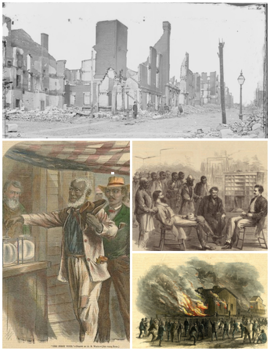Radical Reconstruction

The ruins of Richmond, Virginia after the American Civil War, newly freed African Americans voting for the first time in 1867, Office of the Freedmen's Bureau in Memphis, Tennessee, Memphis Riots of 1866
|
|
| Date | January 1, 1863 to March 31, 1877 (14 years, 2 months and 30 days) |
|---|---|
| Location | United States, Southern United States |
| Also known as | Reconstruction; Radical Reconstruction |
The term Reconstruction Era, in the context of the history of the United States, has two senses: the first covers the complete history of the entire country from 1865 to 1877 following the American Civil War (1861 to 1865); the second sense focuses on the attempted transformation of the Southern United States from 1863 to 1877, as directed by Congress, from states with economies dependent upon slavery, to states in which former slaves were citizens with civil rights. With the three Reconstruction Amendments, the era saw the first amendments to the U.S. Constitution in decades.
Three visions of Civil War memory appeared during Reconstruction: the reconciliationist vision, which was rooted in coping with the death and devastation the war had brought; the white supremacist vision, which included terror and violence; and the emancipationist vision, which sought full freedom, citizenship, and Constitutional equality for African Americans.
Presidents Abraham Lincoln and Andrew Johnson both took moderate positions designed to bring the South back into the union as quickly as possible, while Radical Republicans in Congress sought stronger measures to upgrade the rights of African Americans, including the Fourteenth Amendment to the United States Constitution, while curtailing the rights of former Confederates, such as through the provisions of the Wade–Davis Bill. Johnson, a former Tennessee Senator and slave owner, followed a lenient policy toward ex-Confederates. Lincoln's last speeches show that he was leaning toward supporting the enfranchisement of all freedmen, whereas Johnson was opposed to this.
Johnson's interpretations of Lincoln's policies prevailed until the Congressional elections of 1866. Those elections followed outbreaks of violence against blacks in the former rebel states, including the Memphis riots of 1866 and the New Orleans riot that same year. The subsequent 1866 election gave Republicans a majority in Congress, enabling them to pass the 14th Amendment, take control of Reconstruction policy, remove former Confederates from power, and enfranchise the freedmen. A Republican coalition came to power in nearly all the southern states and set out to transform the society by setting up a free labor economy, using the U.S. Army and the Freedmen's Bureau. The Bureau protected the legal rights of freedmen, negotiated labor contracts, and set up schools and churches for them. Thousands of Northerners came south as missionaries, teachers, businessmen and politicians. Some also entered politics. Hostile whites called them "carpetbaggers". In early 1866, Congress passed the Freedmen's Bureau and Civil Rights Bills and sent them to Johnson for his signature. The first bill extended the life of the bureau, originally established as a temporary organization charged with assisting refugees and freed slaves, while the second defined all persons born in the United States as national citizens with equality before the law. After Johnson vetoed the bills, Congress overrode his veto, making the Civil Rights Act the first major bill in the history of the United States to become law through an override of a presidential veto. The Radicals in the House of Representatives, frustrated by Johnson's opposition to Congressional Reconstruction, filed impeachment charges. The action failed by one vote in the Senate. The new national reconstruction laws -- in particular laws requiring suffrage (the right to vote) for freedmen -- incensed White Supremacists in the south, giving rise to the Klu Klux Klan. During 1867-69 the Klan murdered Republicans and outspoken freedmen in the south, including Arkansas Congressman James M. Hinds.
...
Wikipedia
